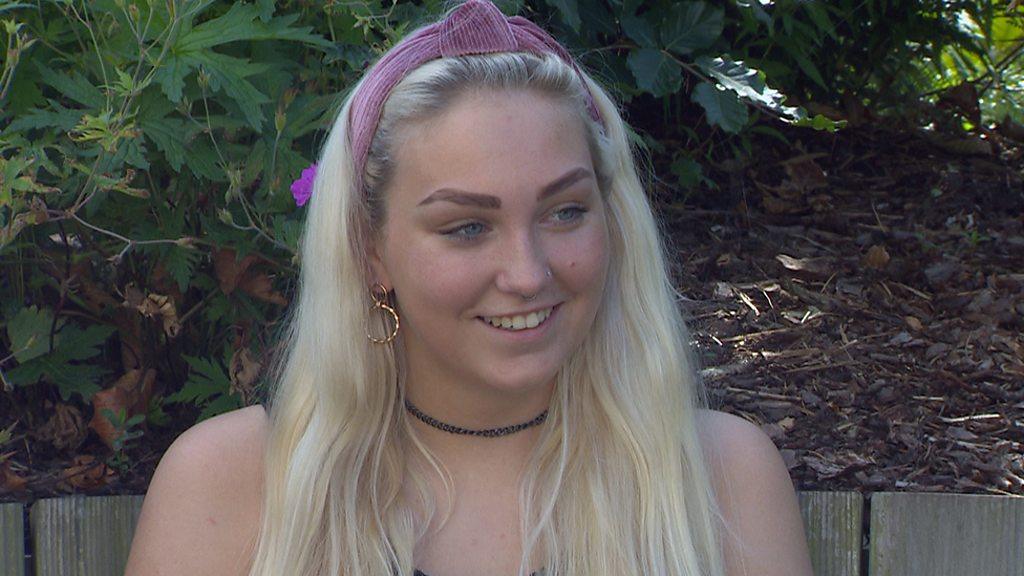University pledge for care-system students
- Published
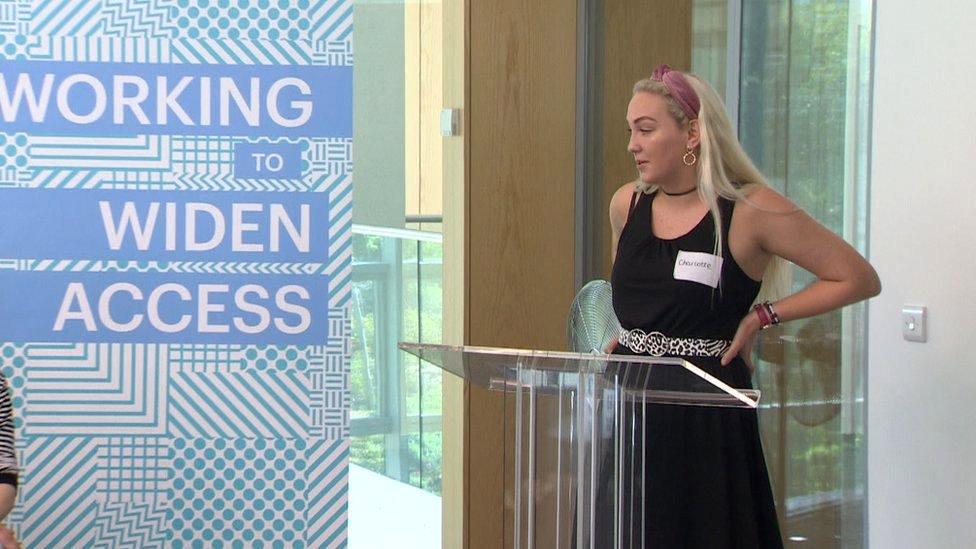
The aim is to give more care-experienced people the chance to get to university
People who have been in the care system are to be guaranteed an offer of a university place if they meet new minimum entry requirements.
All 18 Scottish universities which use the main admissions system have agreed to make the change,
Prof Sally Mapstone, the principal of St Andrews University, called the scheme "transformational".
She hoped it might double the number of Scottish students with experience of the care system from about 300 to 600.
It is widely recognised that people who have been in care face particular challenges at school. For example, their education may have been disrupted as they moved between carers. Far fewer people who have experienced care go on to higher education than the average.
Until now, help to get on university courses has varied between courses and institutions.
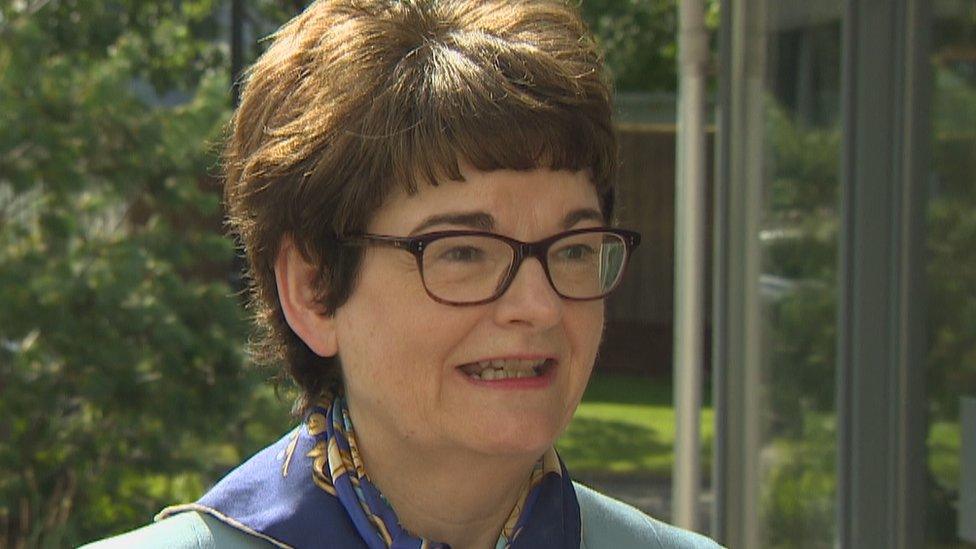
Prof Sally Mapstone called the scheme "transformational"
Under the new scheme, anybody who has been through the care system - at any stage in their life - will be covered. This includes so-called "mature" students who are aged over 21.
The universities insist the exam results needed will still be challenging to achieve - but will often not be quite as demanding as those most applicants need.
People who apply for courses which start next autumn will be the first to benefit.
Prof Mapstone said each course in every Scottish university had set its own minimum requirements.
She said: "This is about identifying potential but also ensuring that potential is really fulfilled."

'It is something that is actually quite achievable'
Charlotte Armitage: "I'll be doing evening courses alongside my full time employment and if I achieve all of that I will be able to enter into university in my first year and hopefully benefit from the guarantee offer."
Charlotte Armitage, 21, was taken into care when she was in S4 aged 15, badly disrupting her education.
She had been set to gain seven National 5s but ended up getting three and leaving school.
Since she left school Charlotte has held a number of jobs - including working for an MP as a case worker, working in public affairs for a charity and a period as a youth worker.
Despite her impressive achievements, she has found it hard to get into further or higher education. Charlotte said colleges had rejected her or placed her on waiting lists because she had not obtained the required qualifications at school.
Charlotte hopes to go to university next year and wants to study for three Highers in the evening in the coming year on top of her work.
She said the new admission policy would have a "positive impact" on a lot of care-experienced people across Scotland.
"It's not something that seems so far away any more," she said. "I know that if I work this little bit harder now it is something that is actually quite achievable."
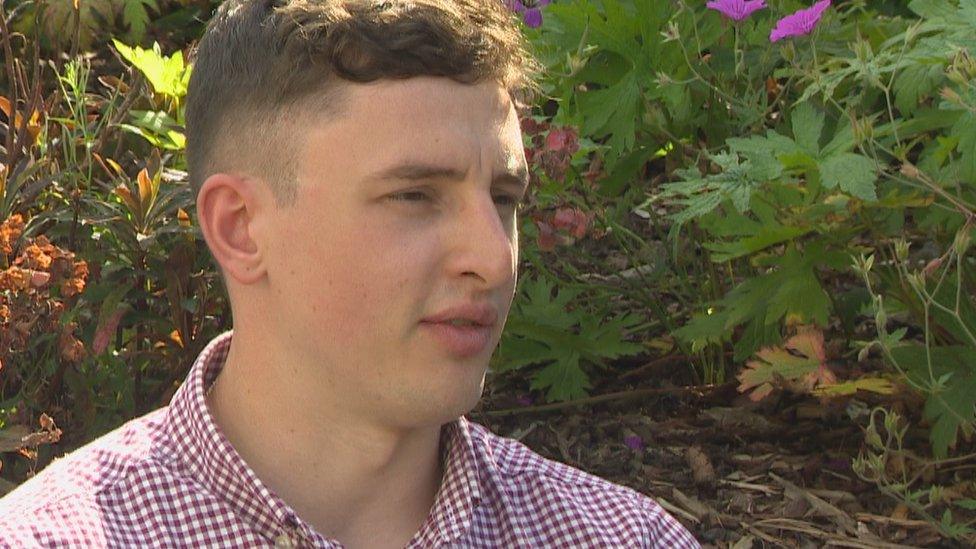
Jamie Dalgoutte first entered care when he was just six months old
Jamie Dalgoutte, 25, has just finished his first year studying for a degree in community development at the University of Glasgow.
He first entered care when he was just six months old and was in the care system throughout his formative years. He also faced difficulties at school - including behavioural problems.
Jamie first went to university aged 20 but dropped out. He is now giving it another go.
He praised the support he was now getting from the university and said students should not be afraid to ask for extra help.
He said: "When you get to university there is an abundance of support, especially at my university. I just had to go and reach for that, source that and accept it."

Widening access
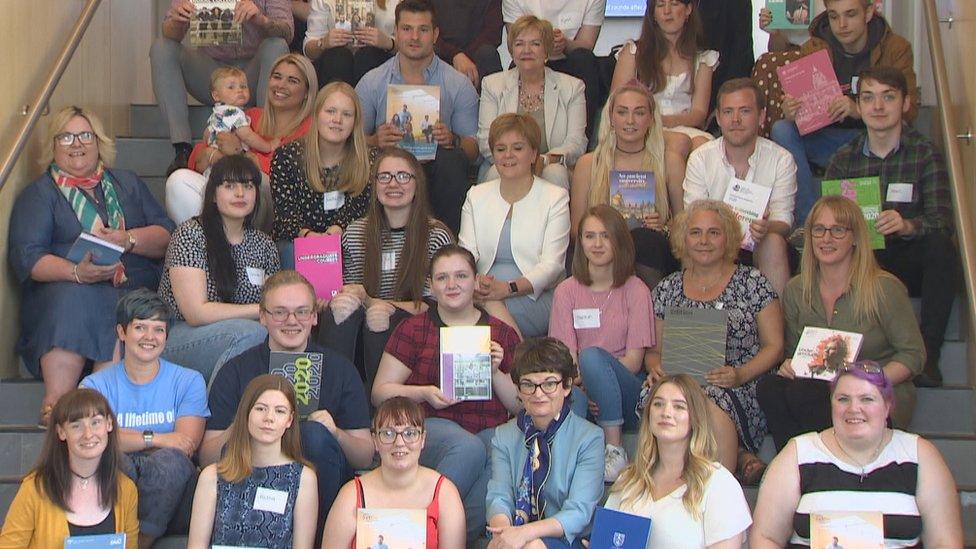
First Minister Nicola Sturgeon (centre) welcomed the scheme
Those who have been in care may face particular difficulties as students - the lack of family support, money problems or finding a place to stay during the summer.
Prof Mapstone said all universities, including St Andrews, had an obligation to provide the support that was needed.
The principal of Glasgow Caledonian University, Prof Pamela Gillies, said her university had a track record of working with students who had been in care and that it was willing to share that experience with other institutions.
She said supporting care-experienced students was "not easy" and universities had to work hard with each individual to understand their needs, which might include hardship.
First Minister Nicola Sturgeon said the initiative would not solve all the challenges people who have been in care faced but called it an important step forward.
She said: "What this is about is trying to help overcome some of the systemic challenges that young people who have grown up in care face when it comes to fulfilling their potential and doing what they want to do in life."
The Scottish Children's Services Coalition said it was delighted by the move, however, much more needed to be done to ensure vulnerable children could achieve their potential.
It added there remained immense challenges ensuring some who had experienced the care system could get into a position where they could contemplate university.
Disadvantaged postcode areas
Universities are keen to highlight the range of efforts they are making to widen access.
The main focus is often on the progress being made to increase the number of students from disadvantaged postcode areas - by 2030, a fifth of students will need to come from these areas.
Universities stress that they are also aware that there will be young people who have faced disadvantage in one form or another in almost every community.
Although universities strongly support widening access and the number of university places available to Scots is around a record high, there have been concerns that ringfencing places for people in particular circumstances may make it harder for others to get a place unless the total number of places rises over time too.
- Published25 July 2019
